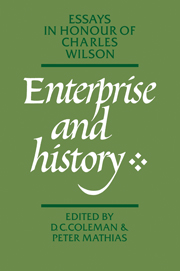Book contents
- Frontmatter
- Contents
- Preface
- List of contributors
- Part I Images and interpretations
- Part II England and the Low Countries in pre-industrial times
- 5 Bruges as a trading centre in the early modern period
- 6 English re-exports and the Dutch staplemarket in the eighteenth century
- 7 ‘Little London’: British merchants in Rotterdam during the seventeenth and eighteenth centuries
- 8 Prejudice and policy: Sir George Downing as parliamentary entrepreneur
- 9 The lawyer as businessman in eighteenth-century England
- Part III Enterprise, finance and politics in the modern world
- Bibliography of Charles Wilson's published works
- Index
7 - ‘Little London’: British merchants in Rotterdam during the seventeenth and eighteenth centuries
Published online by Cambridge University Press: 12 March 2010
- Frontmatter
- Contents
- Preface
- List of contributors
- Part I Images and interpretations
- Part II England and the Low Countries in pre-industrial times
- 5 Bruges as a trading centre in the early modern period
- 6 English re-exports and the Dutch staplemarket in the eighteenth century
- 7 ‘Little London’: British merchants in Rotterdam during the seventeenth and eighteenth centuries
- 8 Prejudice and policy: Sir George Downing as parliamentary entrepreneur
- 9 The lawyer as businessman in eighteenth-century England
- Part III Enterprise, finance and politics in the modern world
- Bibliography of Charles Wilson's published works
- Index
Summary
The economic relationship between Great Britain and the Netherlands during the seventeenth and eighteenth centuries has attracted some of the best minds of historical scholarship of both countries. Their fascinating studies have demonstrated convincingly that the antagonism, bitter rivalry and open conflict dividing the two nations in the seventeenth century did not necessarily result from economic or commercial causes. Nor was the development of ‘uneasy political neutrality’ during the eighteenth century due to any change in their economic relations, even though these relations obviously did change. At the time Dutch capital exports to Britain were gaining in importance. Accordingly, the mutual financial alliance between the two nations may have been strengthened, but this implied ‘no increased warmth’.
As far as the Dutch side of the matter is concerned, the above views have been derived almost exclusively from sources relating to the main centre of Dutch commerce and finance, the city of Amsterdam. Such an approach to the matter is certainly to the point. That city, after all, to a very large extent controlled not only the country's economy but also its political affairs. On the other hand, this view tends to overlook the fact that commercial relations with Britain were far from centring on Amsterdam. It is indeed a moot point whether Rotterdam–on the whole second only to Amsterdam – was not in this particular case of greater importance. The town's nickname, ‘Little London’, was not unjustified.
- Type
- Chapter
- Information
- Enterprise and HistoryEssays in Honour of Charles Wilson, pp. 116 - 134Publisher: Cambridge University PressPrint publication year: 1984
- 3
- Cited by



